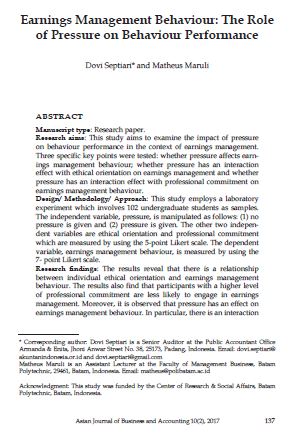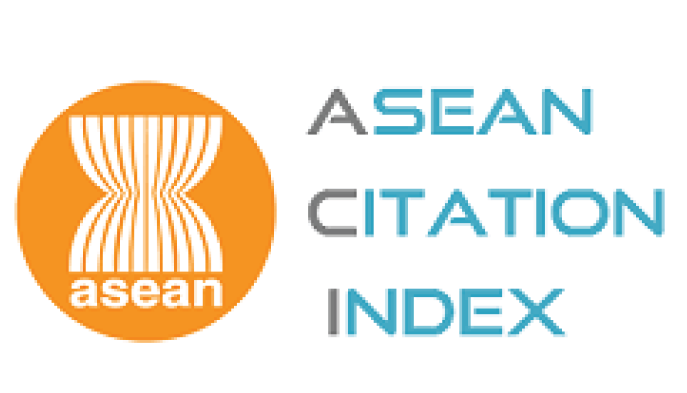Earnings Management Behaviour: The Role of Pressure on Behaviour Performance
Abstract
Manuscript type: Research paper.
Research aims: This study aims to examine the impact of pressure
on behaviour performance in the context of earnings management.
Three specific key points were tested: whether pressure affects earnings
management behaviour; whether pressure has an interaction
effect with ethical orientation on earnings management and whether
pressure has an interaction effect with professional commitment on
earnings management behaviour.
Design/ Methodology/ Approach: This study employs a laboratory
experiment which involves 102 undergraduate students as samples.
The independent variable, pressure, is manipulated as follows: (1) no
pressure is given and (2) pressure is given. The other two independent
variables are ethical orientation and professional commitment
which are measured by using the 5-point Likert scale. The dependent
variable, earnings management behaviour, is measured by using the
7- point Likert scale.
Research findings: The results reveal that there is a relationship
between individual ethical orientation and earnings management
behaviour. The results also find that participants with a higher level
of professional commitment are less likely to engage in earnings
management. Moreover, it is observed that pressure has an effect on
earnings management behaviour. In particular, there is an interaction effect between pressure and earnings management factors such as
ethical orientation and professional commitment.
Theoretical contribution/ Originality: By investigating the effect
of pressure on earnings management behaviour and by examining
the interaction effect between pressure and ethical orientation and
professional commitment, this study adds to current literature.
While prior studies examined the elements of pressure causing
individuals to engage in earnings management behaviour, this study
examines whether pressure, in the form of legal consequences and
written justifications, could potentially reduce earnings management
behaviour.
Practitioner/ Policy implication: The results of this study are
beneficial to the management of organisations in recognising factors
that may influence managers to perform earnings management.
The results of this study can alert policy makers on the use of
pressure, which comes in the form of legal consequences and written
justifications, for minimising earnings management behaviour.
Finally, the outcome of this study also benefits academicians such
that they may want to consider reviewing other ethical orientations
and professional commitment components in their accounting syllabi
so as to increase ethics and professionalism among accounting
students.
Research limitation: The participants of this research are students
who had limited working experiences.
Keywords: Earnings Management Behaviour, Ethical Orientation,
Pressure, Professional Commitment.
JEL Classification: M41
Downloads








